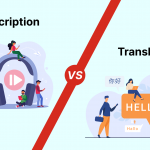 The dynamics of business communication have changed completely. Today, businesses convey their ideas and objectives and interact with the audience through multiple audio and video mediums such as presentations, webinars, seminars, conferences, teleseminars, focus groups, etc. It is always prudent for businesses to record their audio and video content for commercial and legal purposes via business transcription.
The dynamics of business communication have changed completely. Today, businesses convey their ideas and objectives and interact with the audience through multiple audio and video mediums such as presentations, webinars, seminars, conferences, teleseminars, focus groups, etc. It is always prudent for businesses to record their audio and video content for commercial and legal purposes via business transcription.
What is business transcription?
Business transcription is a process of converting the audio or video content into text. The business transcripts serve as crucial material that can be shared with the clients.
What are the types of transcription services?
Verbatim transcription: This type of transcription involves converting every word from the video or audio into text. It also includes transcribing all expressions, fillers, repetitions, and corrections as spoken. Verbatim transcription reflects misspoken words/phrases and grammatical errors ‘as-is’.
Edited or clean transcription: The transcriber decides which words to retain to make the transcript clearer and meaningful. Clean transcription eliminates repetitions, fillers, false starts, spelling errors and basic grammatical errors, etc. The transcriptionist also ensures the text is rendered in the client requested format and remains clearly readable.
What are the advantages of business transcription?
Grabbing eyeballs: Transcribing a video or audio into text allows the business to add SEO-friendly keywords to the transcript that boost brand visibility. Thus, it helps the brand build a formidable digital presence.
Global reach: When a video or audio is transcribed and shared in multiple languages, it becomes easier for the business to attract an audience from various geographies. In addition, transcripts can also be understood by the audience who are hearing-impaired. Therefore, transcription helps the business communicate its ideas and objectives to a larger audience easily.
Easy accessibility: Transcripts can be easily accessed anytime from anywhere. It does not require exclusive tools or software to run video or audio files. The transcripts can be translated and accessed by anyone.
Records essential details: One of the main advantages of transcription is that businesses can record important links, data, or information and preserve them for future reference.
Why do businesses need professional transcription services?
It reduces costs: Most businesses assign their employees as in-house transcriptionists. However, many of them do not have the required experience or expertise to deliver accurate transcription. As a result, businesses have to spend costs on their training. However, by opting for professional transcription services, businesses can reduce and allocate training costs better.
It improves employee productivity: When transcription of business recordings is done by a professional, the employees can focus on improving their skill sets, investing their time in essential business development projects, and boosting their efficiency and productivity.
Assures better quality: The difference between professional and amateur transcription is always evident. Professional transcription services involve an expert who adheres to rigorous transcription quality standards.
It is reliable: Businesses can be sure of the accuracy of the transcription as it will be free of language and basic grammatical errors. In addition, the expert will ensure the meaning and authenticity of the text remains true to the video or audio processed.
Availability of expertise: Some businesses need subject-matter experts to precisely transcribe the video or audio content. For instance, a business presentation on how artificial intelligence (AI) will impact the research industry needs to be transcribed by an expert who is adept at open source research on AI technology and its application in research.
Top 4 features of an efficient transcription service provider
Quality First and Always: The transcription service provider must deliver high-quality and accurate transcription services for all languages. The transcript must be free of language and basic grammatical errors. It should be clear, coherent, and easy to understand.
Timely delivery of service: Time is one of the essential elements for every business. The provider must therefore, prioritize the delivery deadlines. The transcription service must have a quick turnaround time without compromising on transcription quality.
ISO and GDPR compliance: The transcription service provider must have robust security protocols to protect confidential and sensitive business data. It is always viable to trust in a provider that has achieved ISO certification for its security systems.
Versatility: The transcription service provider must deliver various business transcription services such as transcription of corporate meetings, focus group discussions, product launches, conference calls, quarterly earnings calls, annual general meetings, webcast transcription, and more.








Share your thoughts